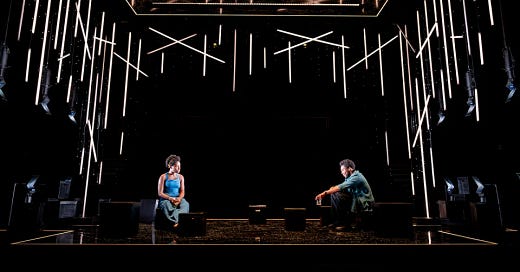A couple of weeks ago, I headed to the Duke of York’s Theatre to watch Shifters with two of my fellow sub-editors at The Stage. We had booked the tickets a few weeks prior, and happily, in the interim, it received a glowing four stars from one of our reviewers. Beyond this endorsement, and the fact that Shifters is a romantic comedy produced by Idris Elba, I knew very little about it, so it was with excited anticipation that I joined the crowd of people in the West End awaiting their Tuesday night entertainment.
I had barely recovered from the thrill of encountering Amelia Dimoldenberg of Chicken-Shop-Dates fame in the toilets when we took our seats. This is only my second theatre-toilet brush with fame (Davina McCall once asked me if a stall was free during the intermission of The Play That Went Wrong). I think celebrity encounters are an occupational hazard of living in London. Last summer, I was on my way to a concert with some friends and as we emerged from the tube at Crystal Palace, Paul Mescal breezed through the ticket barriers, head to toe in white linen. He was using wired earphones, not Bluetooth ones like the rest of us losers. (When I shared this story with my colleagues, I wasn’t the only one with a Paul Mescal-themed tale. As I say, occupational hazard.)
With this excitement unpacked, we were able to take in the view from our central upper circle seats. The staging and lighting is minimal, but effective. The stage is subtly dappled with specks of white and framed by colour-changing stalactites hanging from the ceiling. Black boxes are piled up in the wings like the weight of history threatening to spill over into the present. The present is not, however, entirely defined in this play: this is an intergalactic arena, suspended within space and time, in which two souls are fated to meet again and again.
The story is told by the alternating perspectives of Dre (Tosin Cole), a British Nigerian man who has been raised by his grandmother, and Des (Heather Agyepong), a British Congolese daughter of a neurologist father. The play opens at the wake of Dre’s grandmother, which brings Des, now an accomplished artist, back home to pay her respects – and also, perhaps, to see Dre again. They first bonded as awkward, outspoken teenagers and now they must rediscover their way; their tentative catch-up conversation soon becomes familiar, whisky-fuelled banter. As Des helps Dre pack up his nan’s things, we witness different moments in their shared history, triggered by objects pulled from the black boxes. Oh, the boxes – I do enjoy a good physical metaphor. Memories and traumas have been shut away, repressed, for years in these boxes. But now everything must be, quite literally, unpacked in this latent meeting between the two characters.
Heavy themes are explored throughout the play. Both characters are grieving lost loved-ones and are struggling with intergenerational issues. Dre has inherited a depressive condition from his father and is dealing with the reality of family members abandoning him. Des is experiencing a form of PTSD; in one of the standout moments in the play, Agyepong delivers a powerful monologue about the Black female body. Writer Benedict Lombe skillfully interweaves these moments with ones of levity and laughter: in one scene imbued with chemistry and sexual tension, Dre and Des playfully tease each other about their respective Nigerian and Congolese musical influences. When the pair finally kiss, it is a moment of true catharsis; my audience reacted accordingly with a very audible “ahhhh”.
At this point, I was preparing myself for a Normal People-esque parting, in which two people who are clearly meant to be together are thwarted by their own frustrating inability to communicate. Des does leave to catch her plane back home, but then she returns, à la Rachel Green, greeting Dre with the same nerdy wave which began their first encounter of the play. There is the understanding that their two souls are tied, destined to cross paths again and again in this lifetime and the next, and the next. Dre has given Des permission to move on from him – in a sense, he has released her from her tie to him – yet she cannot help but return. Does this mean they can start over, and learn from the toxicity which broke the relationship down in the first place? Or are they stuck in a loop, like Sisyphus, fated to keep pushing the boulder up the hill, to no avail?
Shifters is a sensual, joyful, and, at times, harrowing love story between two young Black people. But it is also a philosophical meditation on the concept of soulmates. Do they exist? Is it wise to think of someone as your soulmate? Should you let your soulmate go, if they are not good for you? Shifters takes these questions and multiplies them tenfold.




The best places to meet Celebs!!